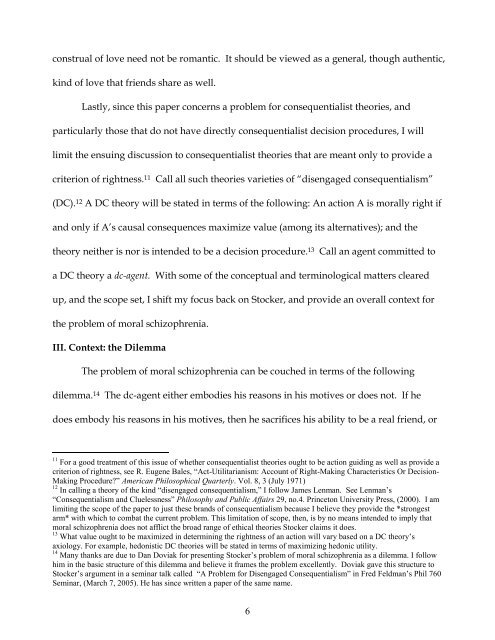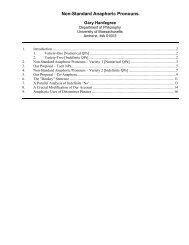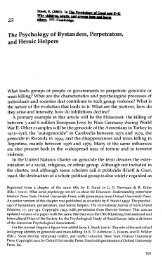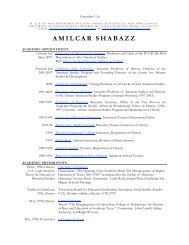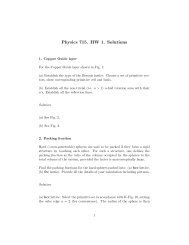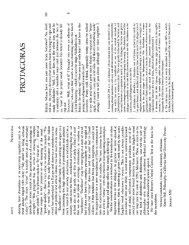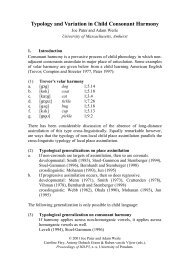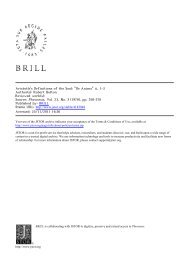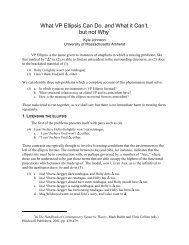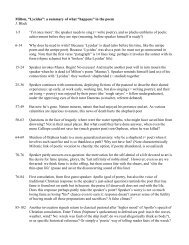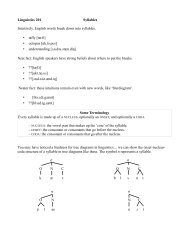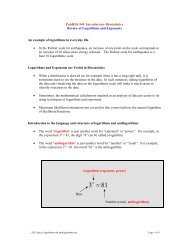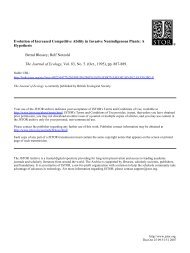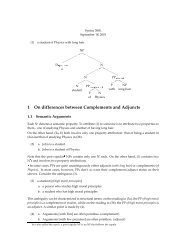1 Confessions of a Moral Schizophrenic* By Jayme Johnson I ...
1 Confessions of a Moral Schizophrenic* By Jayme Johnson I ...
1 Confessions of a Moral Schizophrenic* By Jayme Johnson I ...
Create successful ePaper yourself
Turn your PDF publications into a flip-book with our unique Google optimized e-Paper software.
construal <strong>of</strong> love need not be romantic. It should be viewed as a general, though authentic,<br />
kind <strong>of</strong> love that friends share as well.<br />
Lastly, since this paper concerns a problem for consequentialist theories, and<br />
particularly those that do not have directly consequentialist decision procedures, I will<br />
limit the ensuing discussion to consequentialist theories that are meant only to provide a<br />
criterion <strong>of</strong> rightness. 11 Call all such theories varieties <strong>of</strong> “disengaged consequentialism”<br />
(DC). 12 A DC theory will be stated in terms <strong>of</strong> the following: An action A is morally right if<br />
and only if A’s causal consequences maximize value (among its alternatives); and the<br />
theory neither is nor is intended to be a decision procedure. 13 Call an agent committed to<br />
a DC theory a dc-agent. With some <strong>of</strong> the conceptual and terminological matters cleared<br />
up, and the scope set, I shift my focus back on Stocker, and provide an overall context for<br />
the problem <strong>of</strong> moral schizophrenia.<br />
III. Context: the Dilemma<br />
The problem <strong>of</strong> moral schizophrenia can be couched in terms <strong>of</strong> the following<br />
dilemma. 14 The dc-agent either embodies his reasons in his motives or does not. If he<br />
does embody his reasons in his motives, then he sacrifices his ability to be a real friend, or<br />
11 For a good treatment <strong>of</strong> this issue <strong>of</strong> whether consequentialist theories ought to be action guiding as well as provide a<br />
criterion <strong>of</strong> rightness, see R. Eugene Bales, “Act-Utilitarianism: Account <strong>of</strong> Right-Making Characteristics Or Decision-<br />
Making Procedure?” American Philosophical Quarterly. Vol. 8, 3 (July 1971)<br />
12 In calling a theory <strong>of</strong> the kind “disengaged consequentialism,” I follow James Lenman. See Lenman’s<br />
“Consequentialism and Cluelessness” Philosophy and Public Affairs 29, no.4. Princeton University Press, (2000). I am<br />
limiting the scope <strong>of</strong> the paper to just these brands <strong>of</strong> consequentialism because I believe they provide the *strongest<br />
arm* with which to combat the current problem. This limitation <strong>of</strong> scope, then, is by no means intended to imply that<br />
moral schizophrenia does not afflict the broad range <strong>of</strong> ethical theories Stocker claims it does.<br />
13 What value ought to be maximized in determining the rightness <strong>of</strong> an action will vary based on a DC theory’s<br />
axiology. For example, hedonistic DC theories will be stated in terms <strong>of</strong> maximizing hedonic utility.<br />
14 Many thanks are due to Dan Doviak for presenting Stocker’s problem <strong>of</strong> moral schizophrenia as a dilemma. I follow<br />
him in the basic structure <strong>of</strong> this dilemma and believe it frames the problem excellently. Doviak gave this structure to<br />
Stocker’s argument in a seminar talk called “A Problem for Disengaged Consequentialism” in Fred Feldman’s Phil 760<br />
Seminar, (March 7, 2005). He has since written a paper <strong>of</strong> the same name.<br />
6


